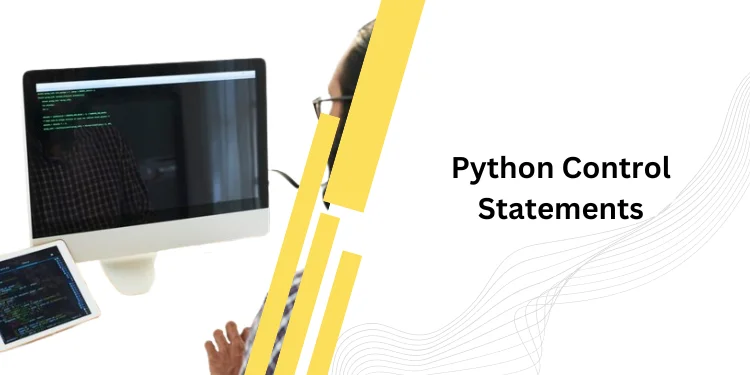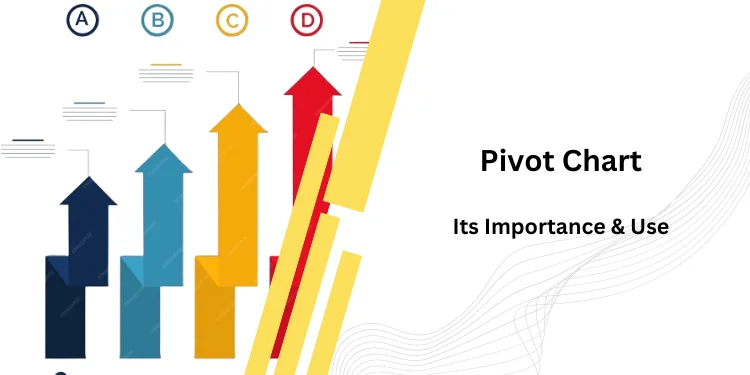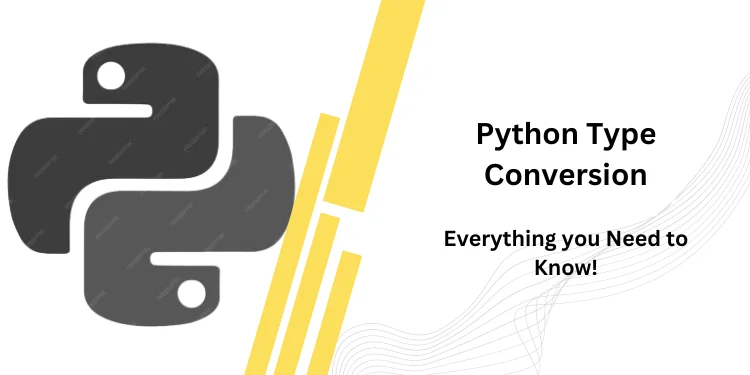Introduction of Artificial Intelligence
Are you curious about the origins of Artificial Intelligence (AI)? Or how has AI evolved? You’re in luck, as we are here to introduce this increasingly popular field briefly.
To understand the history of Artificial Intelligence, we need to start with the Father of Artificial Intelligence, Alan Turing. Turing was a mathematician and computer scientist who developed the idea of a thinking machine in 1950. His paper “Computing Machinery and Intelligence” proposed an idea still seen in computers today that machines can be built to mimic human intelligence and thus be able to ‘think’ for themselves.
Turing, the Father of Artificial Intelligence, laid the foundation for what we now know as AI. Since then, several milestones have been achieved in developing AI technology. For example, in the early 1950s, Marvin Minsky and John McCarthy created a computer program called “Logic Theorist,” which could solve mathematical problems using logic rules. This marked the beginning of what is known as “symbolic AI,” – which focused on programming computers to think like humans by inputting knowledge into them from external sources.
Fast forward to today – with advancements such as machine learning, deep learning, natural language processing, and robotics, AI is quickly becoming more powerful than ever before! We are now in an age of rapid innovation regarding AI tech – from self-driving cars on our roads, artificial assistants for our phones, and even AI-controlled robots employed by some businesses, all thanks to the Father of Artificial Intelligence.
Have a look at the data science course in delhi
Evidently, the future holds great potential for AI technology – but only time will tell exactly how far its capabilities will take us! Whether you are looking to get involved in developing this technology further or want it to function with the knowledge it has today.
Overview of AI’s History
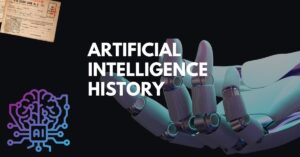
The history of Artificial Intelligence (AI) dates back to the mid-20th century, when Alan Turing, the Father of Artificial Intelligence, created the ‘Imitation Game,’ otherwise known as the Turing Test. He is often called the ‘Father of AI’ for his foundational work in computing machines and developing ideas that would become the foundation for modern AI.
Alan Turing, the Father of Artificial Intelligence, was a British computer scientist born in 1912 who contributed significantly to WWII research on code breaking and deciphering German Enigma messages. This culminated in the creation of the famous Imitation Game, which later became known as The Turing Test. The test evaluated a machine’s ability to imitate a human conversation by requiring someone conversing with it to be unable to distinguish whether they were speaking with a machine or a human.
This set a precedent for evaluating AI capabilities and initiated further advancements in AI research that eventually led to today’s deep learning networks, voice assistants, and autonomous vehicles. Today, AI is being used to solve difficult problems, automate mundane tasks, and make decisions faster than ever before, and new applications are constantly emerging.
Alan Turing is called the Father of Artificial Intelligence due to his pioneering work in computing machines and the creation of The Turing Test, which has come to define modern AI development. His story inspires those seeking to advance AI research today and help shape its future innovations.
Also Visit: data science course pune
Major Contribution by the Father of Artificial Intelligence
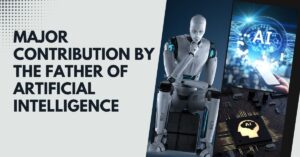
When thinking about the Father of Artificial Intelligence (AI), most people immediately think of Alan Turing. His pioneering work in Computing Machinery and Intelligence laid modern AI’s foundation. Thanks to Turing’s research and development, we now have the ability to use AI in everyday life.
Turing Father of Artificial Intelligence played a major role in paving the future of AI by designing a test with which to measure machine intelligence. This has helped us understand more about how machines learn and develop more efficient ways of training them. Furthermore, his work is still influencing millions of lives today as he laid the groundwork for natural language processing, computer vision, and speech recognition systems that are being used to automate data entry and provide intelligent feedback for decisions made.
The history of AI would have been drastically different if not for Turing’s contributions, which is why we call him the Father of Artificial Intelligence. Thanks to him, we can now experience the incredible advances artificial intelligence has brought us in recent years. And as we look ahead to what’s yet to come, it’s safe to say that Turing played an instrumental in shaping both the past and future of AI.
From self-driving cars and automated offices to bots interacting with customers or providing assistance on your smartphone, Turing’s legacy will continue through all these AI-powered applications and technological advancements. So next time you encounter an interaction with artificial intelligence, take a moment to thank Alan Turing, the Father of Artificial Intelligence, for his incredible contributions that shaped this cutting-edge technology’s history, present, and future!
Current Technologies Developed from the Father of Artificial Intelligence Contributions
The Father of Artificial Intelligence (AI) is Alan Turing, a pioneering computer scientist, and mathematician. Turing’s contributions to the field of computer science laid the foundation for modern AI research. He was known for his revolutionary insights into the potential of technology, including developing theoretical models of machine learning and artificial intelligence.
Turing’s work on the development of computers greatly influenced the world today and has defined how we interact with technology. His most influential contribution to AI research came in a 1950 paper titled “Computing Machinery and Intelligence,” where he proposed a test for determining if a machine can think. This concept laid the groundwork for modern AI and its applications in many areas, from communication systems to autonomous vehicles and more.
Since then, AI has become an integral part of our lives. From self-driving cars to smart tech that can recognize faces or interpret natural language, AI technologies are becoming increasingly sophisticated and ubiquitous in our daily lives because of the Father of Artificial Intelligence. With its ability to process vast amounts of data quickly and accurately, AI can help us solve complex problems efficiently and effectively. As such, it has opened up new possibilities in fields like healthcare, finance, education, robotics, cybersecurity, and more.
Despite its numerous benefits, there are some ethical considerations when it comes to developing and using AI technologies — particularly when it comes to deciding how much autonomy machines should have in decision-making processes while still protecting human rights. It is also necessary to consider potential risks associated with implementing sophisticated AI systems — such as increasing job di
splacement or amplifying existing social biases embedded within datasets used for training algorithms.
The impact of the Father of Artificial Intelligence Alan Turing’s contributions to Artificial Intelligence cannot be ignored, and he deserves to be called the Father of Artificial Intelligence; his research laid the groundwork for modern AI applications which almost every human is using through smartphones, smart TV’s and automatic car, it has made lives so easy today.
Related Topic: What is ChatGPT
Potential Future Applications Driven by AI
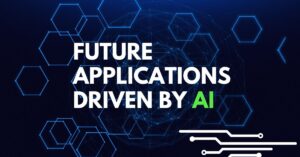
Artificial Intelligence (AI) is an ever-evolving branch of technology that has come a long way since the days of its infancy. We can attribute much of its current success to Alan Turing, the Father of Artificial Intelligence, who was a computer scientist, mathematician, and logician. Turing proposed the now famous “Turing Test,” which tested the ability of machines to think and behave like humans. This turned out to be the foundation for modern AI development.
Today, advances in AI have enabled a wide range of new applications that are being used across all industries. From detecting fraud and breaches to informing decision-making to automating customer service through chatbots and virtual assistants, AI has extended far beyond what Alan Turing, the father of Artificial Intelligence, would have himself imagined.
Furthermore, according to experts in the field, we can expect some exciting new applications driven by AI in the future. Autonomous vehicles are already being tested as an effective way to reduce traffic congestion and accidents due to human error. Robotics processes are also helping individuals handle more complex tasks faster while also minimizing costs associated with labor.
However, with great potential comes great responsibility and challenges, such as privacy issues or data security threats that can compromise the advantage of any automated system or process. Therefore, it is important for companies developing AI products and applications to take these into consideration when making decisions about their technology roadmap.
Innovations & Adaptations for New Uses of AI
AI technology had evolved greatly since its origins in the 1950s when computer scientist John McCarthy first coined “Artificial Intelligence.” Over the past few decades, AI has developed remarkably, and its impacts are far-reaching. AI is now responsible for many advancements that have changed the world in many ways, from language processing and developing expert systems to robotics, machine learning applications, natural language processing, machine vision and image recognition, and autonomous vehicles.
What began as an ambitious dream of John McCarthy and his peers has blossomed into an ever-growing industry impacting our lives more profoundly daily. AI is used to automate tedious processes, increase efficiency, and make decisions faster than ever before. AI-powered software can analyze data faster than human brains ever could, allowing it to uncover patterns that would be impossible to detect on our own. This means that AI-driven software can help us solve complex problems more accurately and efficiently than ever before. With everything we can achieve through AI, we should not forget the Father of Artificial Intelligence, Allan Turing.
Robotics is one sector that has benefited immensely from the development of AI technology over the years. Robotics requires immense amounts of precision; machines need to be able to perform tasks without making mistakes or endangering human workers or bystanders. By incorporating deep learning algorithms into robot programming, engineers now have greater control over how robots work and how they adapt to changing conditions in environments such as factories or hazardous sites where humans aren’t allowed to go.
At its core, machine vision combines computer science and artificial intelligence algorithms with automated cameras and sensors capable of recognizing objects in various settings. In addition to recognizing objects visually as humans do with eyesight, machine vision can provide additional value to it.
have a look at The complete Artificial Intelligence Syllabus
Ethical Considerations Surrounding AI
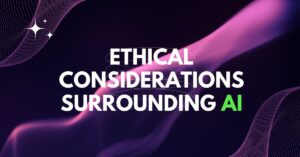
AI, or artificial intelligence, has become a fundamental part of our lives. We rely on it to help make life easier. But with the increasing use and development of AI technology, ethical considerations must be carefully considered.
The history of AI dates back to the 1950s when Alan Turing, often regarded as the father of Artificial Intelligence, developed the Turing Test for determining whether a computer could think intelligently. Since then, computer scientists have made countless advances in AI capabilities and technology that continue to evolve today.
Data privacy and transparency are the main concerns when discussing ethical considerations surrounding AI. As AI advances, proper safeguards and protocols must be implemented to ensure data remains secure and private. Additionally, developers of AI technologies must also consider their responsibility for accuracy and fairness when developing algorithms so that bias does not occur within the output of results.
Another important consideration is the impact that artificial intelligence has on both society and culture as a whole. This can include everything from automation creating job displacement to increased racial/ethnic discrimination within decision-making algorithms. To prevent these issues from escalating further, governments must take steps toward regulating these technologies while still allowing their innovation and use.
The future of artificial intelligence created by the Father of Artificial Intelligence is uncertain yet promising; however, it is important to remember ethical considerations while developing these technologies, such as preserving data privacy, promoting transparency & responsibility in development processes, avoiding any introduction of bias or inaccuracies into algorithms or algorithm outputs, limiting impact on society & culture as much as possible and forming government regulations accordingly. With careful attention given to all these areas, we can confidently move forward with embracing this evolving technology without leaving behind any sense of ethical ambiguity.
How Learning About the Father of Artificial Intelligence Can Help Shape a Better Understanding and Use Of AI
Learning about the Father of Artificial Intelligence (AI) can help us better understand and use AI in our lives today. Alan Turing was one of the Fathers of AI, paving the way for modern computing and ushering in a new era of real-world applications for Artificial Intelligence.
Alan Turing Father of Artificial Intelligence, was a British mathematician and computer scientist whose work revolutionized the field of artificial intelligence. He is credited with developing the foundational concepts that helped create modern computers and the Turing Test. This test determines whether or not a machine has achieved true artificial intelligence. With his groundbreaking work, Alan Turing helped bring us to where we are now with AI — a technology used in everyday tasks and cutting-edge research.
Turing’s legacy also extends to our current understanding and use of AI. His pioneering
research established many of the fundamentals upon which modern Artificial Intelligence is built, such as algorithmic decision-making, computer programming principles, statistical reasoning, and pattern recognition – to name a few. His contributions helped shape today’s evolving technologies in ways that he could not have imagined when he began his work.
At present, many challenges and opportunities with the current usage of AI stem from Alan Turing’s original ideas. To maximize its potential, it must be applied responsibly and ethically — something that only comes from learning about AI’s history and the true Father of Artificial Intelligence, such as Alan Turing, who inspired its development in its early stages. By studying Alan Turing’s ideas, achievements, and successes, we can continue to build on his legacy and apply our improved understanding to further develop Artificial Intelligence into something even more powerful than ever before.
conclusion
Advancements in AI since the Father of Artificial Intelligence, Alan Turing’s days, give us a glimpse at what might be achievable if technology continues down this track in the coming years in various areas, such as autonomous vehicles, robotics processes, and smart systems. Many more so, we must thank the Father of Artificial Intelligence for giving us such an intelligent tool that has improved human life.







